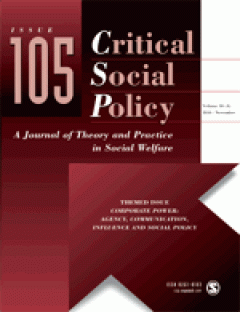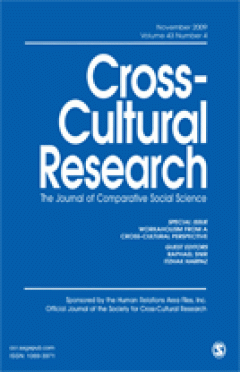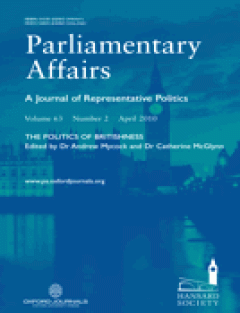Filter by

Corporate strategy, corporate capture: Food and alcohol industry lobbying and…
This article examines two industry sectors — those making and selling fast food and alcoholic beverages or associated products. We examine their role in influencing policy and decision making on the regulation of their products for health reasons. We argue that the food and alcohol industries engage in a very wide range of tactics and strategies to defend and indeed to promote their ‘licence to…
- Edition
- Vol. 30 no. 4, November 2010.pp. 564-589
- ISBN/ISSN
- 02610183
- Collation
- -
- Series Title
- Critical Social Policy
- Call Number
- -

Winters, Summers, and Destructive Leadership Cultures in Rich Regions
Van de Vliert’s (2009) climato-economic theory of culture proposes that the impact of climatic demands on culture is influenced by wealth resources. In rich regions, much cold and heat in conjunction with relatively little wealth (undermatching) and little cold and heat in conjunction with relatively much wealth ( overmatching) both are thought to produce less destructive leadership cultures th…
- Edition
- Vol. 44 no. 4, November 2010.pp. 315-340
- ISBN/ISSN
- 10693971
- Collation
- -
- Series Title
- Cross-Cultural Research
- Call Number
- -

Assessing Cross-National Invariance of the Three-Component Model of Organizat…
This study examined cross-national invariance of Meyer and Allen’s three-component model of organizational commitment using samples of university faculty from six European countries. The analysis revealed strict factorial measurement invariance of affective, continuance, and normative organizational commitment constructs (AC, CC, and NC, respectively). While the samples failed to differ in AC a…
- Edition
- Vol. 44 no. 4, November 2010.pp. 341-373
- ISBN/ISSN
- 10693971
- Collation
- -
- Series Title
- Cross-Cultural Research
- Call Number
- -

Cross-Cultural Research on the Reliability and Validity of the Mayer-Salovey-…
Despite the rather large literature concerning emotional intelligence, the vast majority of studies concerning development and validation of emotional intelligence scales have been done in the Western countries. Hence, a major limitation in this literature is its decidedly Western focus. The aim of this research was to assess the psychometric properties of the Mayer-Salovey-Caruso Emotional Int…
- Edition
- Vol. 44 no. 4, November 2010.pp. 374-404
- ISBN/ISSN
- 10693971
- Collation
- -
- Series Title
- Cross-Cultural Research
- Call Number
- -

House Floor Area as a Correlate of Marital Residence Pattern: A Logistic Regr…
The goal of this article is to reflect on the relationship between average house floor area and marital residence pattern.This article brings three novel elements to this research problem: (a) it combines cases from the previous studies thus creating a larger empirical base, (b) logistic regression is used as an analytical technique which can test the significance and strength of the correlatio…
- Edition
- Vol. 44 no. 4, November 2010.pp. 405-424
- ISBN/ISSN
- 10693971
- Collation
- -
- Series Title
- Cross-Cultural Research
- Call Number
- -

The Results: How Britain Voted
Between 2005 and 2010, despite some ‘random shocks’ caused by the emergence of new party leaders, the trends in party support suggested a return to the traditional inter-election cycle. During the election campaign, however, there were dramatic changes as the popularity of Liberal Democrat leader, Nick Clegg, increased sharply. In terms of votes, the Conservatives emerged as the largest party b…
- Edition
- Vol. 63, No. 4, October 2010.pp. 588-606.
- ISBN/ISSN
- 00312290
- Collation
- -
- Series Title
- Parliamentary Affairs
- Call Number
- -

Five Days in May: A New Political Order Emerges
The 2010 general election result was so finely balanced that only a combination of the Conservatives and Liberal Democrats together could command a workable majority in the House of Commons. However, this combination meant that the Liberal Democrats had to abandon their centre-left positioning and, accepting the arithmetic conclusion of the election, help form a centre-right administration. Thi…
- Edition
- Vol. 63, No. 4, October 2010.pp. 607-622
- ISBN/ISSN
- 00312290
- Collation
- -
- Series Title
- Parliamentary Affairs
- Call Number
- -

So What Went Wrong with the Electoral System? The 2010 Election Result and th…
Single-member plurality is often thought to facilitate a two-party system of alternating single-party majority government. However, no party secured an overall majority in the 2010 UK election, which was followed by the formation of the first peacetime coalition government since the 1930s. This article assesses whether this outcome was a one-off occurrence or was symptomatic of longer term chan…
- Edition
- Vol. 63, No. 4, October 2010.pp. 623-638
- ISBN/ISSN
- 00312290
- Collation
- -
- Series Title
- Parliamentary Affairs
- Call Number
- -

New Labour and Political Change
Labour won three general elections and governed for 13 years between 1997 and 2010, the longest period of government in its history. How far Labour succeeded in changing British politics permanently in this period has been much debated. Different approaches to this question are considered, as well as different contexts that are useful in forming an assessment. The impact of new Labour on electo…
- Edition
- Vol. 63, No. 4, October 2010.pp. 639-652
- ISBN/ISSN
- 00312290
- Collation
- -
- Series Title
- Parliamentary Affairs
- Call Number
- -

Labour's Campaign: Things Can Only Get Worse?
Labour's failure to secure re-election hardly came as a surprise given its performance in government and at the polls since 2005. It was moreover the third election a row that the party had lost votes from across the social spectrum. However, despite a flawed leader and a difficult economic context, the party nearly secured enough seats to provide the basis for a coalition with the Liberal Demo…
- Edition
- Vol. 63 No.4, October 2010.pp. 653-666
- ISBN/ISSN
- 00312290
- Collation
- -
- Series Title
- Parliamentary Affairs
- Call Number
- -

Strategic Recovery? The Conservatives Under David Cameron
Under David Cameron the Conservative party recovered sufficiently to deliver a Conservative Prime Minister. Cameron achieved what three leaders before him did not: a consistent poll lead over Labour and a broadening of the Conservative message. This chapter also highlights two major limitations to the Conservative ‘recovery’; (i) the size of the Conservative base has not enlarged: roughly the s…
- Edition
- Vol. 63. No. 4, October 2010.pp. 667-688
- ISBN/ISSN
- 00312290
- Collation
- -
- Series Title
- Parliamentary Affairs
- Call Number
- -

The Campaign That Changed Everything and Still Did Not Matter? The Liberal De…
This contribution examines the Liberal Democrat campaign and their subsequent performance in the 2010 General Election. Despite what appeared to be a ground-breaking campaign, the Liberal Democrat performance in the 2010 election was—as Clegg acknowledged—disappointing for the party. Here we argue that the story of the 2010 Liberal Democrat election was the remarkable similarity with 2005, with…
- Edition
- Vol. 63. No. 4. October 2010.pp. 689-707
- ISBN/ISSN
- 00312290
- Collation
- -
- Series Title
- Parliamentary Affairs
- Call Number
- -

A Catenaccio Game: the 2010 Election in Scotland
The result of the general election in Scotland was very different from the rest of the UK. No seats changed hands. Labour consolidated its position as the dominant party in Scotland. Cameron may have been able to detoxify the Conservatives’ image in England but failed to do the same in Scotland. The Liberal Democrats were the only major party in Scotland to see its vote share reduced. Neverthel…
- Edition
- Vol. 63. No. 4. October 2010.pp. 708-725
- ISBN/ISSN
- 00312290
- Collation
- -
- Series Title
- Parliamentary Affairs
- Call Number
- -

Wales and the 2010 General Election
Wales is distinctive in British general elections for its higher than average levels of support for the Labour Party. However, following evidence of Labour decline and public opposition after its unprecedented 13 years of office, there were questions over whether perceived Labour one-partyism in Wales would be finally superseded. In practice, although the election resulted in an increased fragm…
- Edition
- Vol. 63. No. 4. October 2010.pp. 726-741
- ISBN/ISSN
- 00312290
- Collation
- -
- Series Title
- Parliamentary Affairs
- Call Number
- -

Northern Ireland: Unionism Loses More Leaders
Northern Ireland's 2010 Westminster election saw the dramatic unseating of the First Minister, Peter Robinson, from his East Belfast seat by the cross-community Alliance Party. Beyond the headline scalp, the Democratic Unionist Party and Sinn Fein continued to dominate the Unionist and Nationalist electoral blocs, with Sinn Fein holding its five seats. This success raised the outside possibilit…
- Edition
- Vol.63. No 4. October 2010.pp. 742-759
- ISBN/ISSN
- 00312290
- Collation
- -
- Series Title
- Parliamentary Affairs
- Call Number
- -

‘Wags’, ‘Wives’ and ‘Mothers’ But what about Women Politicians?
The UK general election of 2010 should have been a critical one for women. But it was not to be. Despite all of the main political parties claiming to want more women MPs the increase in their number relative to the 2005 Parliament was just 2.5%. Women remain under-represented numerically in the House of Commons, constituting less than one-quarter of all MPs. The election campaign was largely w…
- Edition
- Vol. 63. No. 4. October 2010.pp. 760-777
- ISBN/ISSN
- 00312290
- Collation
- -
- Series Title
- Parliamentary Affairs
- Call Number
- -

Party Finance: Normal Service Resumed?
Whereas the period under Tony Blair had seen Labour emerge as the richer of the two largest parties, the 2010 election was characterised by significant disparities in party wealth, with the Conservatives emerging as the strongest party by some margin. This had a significant bearing on how the campaigns were fought, with Labour needing to make decisions on how to campaign based principally on wh…
- Edition
- Vol. 63. No. 4. October 2010.pp. 778-801
- ISBN/ISSN
- 00312290
- Collation
- -
- Series Title
- Parliamentary Affairs
- Call Number
- -

The Media and the 2010 Campaign: the Television Election?
The 2010 election was one of the most competitive campaigns of recent decades. The first televised leaders' debates along with the rise of online social networking led to renewed speculation about the potential influence of the media in campaigns. By contrast the press appeared to revert to pre mid-1990s form with strong support for the Conservatives and personal attacks on their opponents. Thi…
- Edition
- Vol. 63. No. 4. October 2010.pp. 802-817
- ISBN/ISSN
- 00312290
- Collation
- -
- Series Title
- Parliamentary Affairs
- Call Number
- -

From Big Government to Big Society: Changing the State–Society Balance
Much of the 2010 election was fought around the issue of the recession and the public borrowing deficit. However, whilst economic policy was highly salient, there was little fundamental difference between the parties over what needed to be done. All three of the major parties accepted the need to cut the deficit through reducing public expenditure. What the response to the crisis did reveal was…
- Edition
- Vol. 63. No. 4. October 2010.pp. 818-833
- ISBN/ISSN
- 00312290
- Collation
- -
- Series Title
- Parliamentary Affairs
- Call Number
- -

The Calm After the Storm? Foreign and Security Policy from Blair to Brown
This article examines the main aspects of the UK's foreign and security policy across the 2005–2010 Parliament. It begins by discussing the highpoint of foreign policy during the period, and goes on to consider the evolution of the UK's foreign policy doctrine, looking in particular at whether Brown established a world view that was distinctive from his predecessor. The analysis then turns to t…
- Edition
- Vol. 63. No 4. October 2010.pp. 834-848
- ISBN/ISSN
- 00312290
- Collation
- -
- Series Title
- Parliamentary Affairs
- Call Number
- -
 Computer Science, Information & General Works
Computer Science, Information & General Works  Philosophy & Psychology
Philosophy & Psychology  Religion
Religion  Social Sciences
Social Sciences  Language
Language  Pure Science
Pure Science  Applied Sciences
Applied Sciences  Art & Recreation
Art & Recreation  Literature
Literature  History & Geography
History & Geography